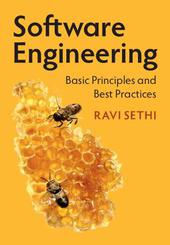
|
Software Engineering: Basic Principles and Best Practices
Hardback
Main Details
| Title |
Software Engineering: Basic Principles and Best Practices
|
| Authors and Contributors |
By (author) Ravi Sethi
|
| Physical Properties |
| Format:Hardback | | Pages:360 | | Dimensions(mm): Height 251,Width 177 |
|
| Category/Genre | Software Engineering |
|---|
| ISBN/Barcode |
9781316511947
|
| Classifications | Dewey:005.1 |
|---|
| Audience | |
|---|
| Illustrations |
Worked examples or Exercises
|
|
Publishing Details |
| Publisher |
Cambridge University Press
|
| Imprint |
Cambridge University Press
|
| Publication Date |
8 December 2022 |
| Publication Country |
United Kingdom
|
Description
Software engineering is as much about teamwork as it is about technology. This introductory textbook covers both. For courses featuring a team project, it offers tips and templates for aligning classroom concepts with the needs of the students' projects. Students will learn how software is developed in industry by adopting agile methods, discovering requirements, designing modular systems, selecting effective tests, and using metrics to track progress. The book also covers the 'why' behind the 'how-to', to prepare students for advances in industry practices. The chapters explore ways of eliciting what users really want, how clean architecture divides and conquers the inherent complexity of software systems, how test coverage is essential for detecting the inevitable defects in code, and much more. Ravi Sethi provides real-life case studies and examples to demonstrate practical applications of the concepts. Online resources include sample project materials for students, and lecture slides for instructors.
Author Biography
Ravi Sethi is Laureate Professor of Computer Science at the University of Arizona, USA, and is an ACM fellow. He co-authored Compilers: Principles, Techniques, and Tools (1985), popularly known as the 'dragon' book, and launched Avaya Labs.
Reviews'If you are looking for an informative introductory text in software engineering, then this book is for you. This primer contains succinct and accessible text with recent examples. There isn't another text on the market that captures the main essence of the field so successfully. I loved this book and highly recommend it to all software engineering students.' Herbert H. Tsang, Simon Fraser University 'It is an exceptional book for software engineering or practicum classes because it teaches how to work with real customers using today's development processes. It's filled with motivating real-world examples and supplies a framework students can use to complete term projects successfully. This book, more than others I've seen, prepares students for their work environment after graduation.' Joann J. Ordille, Rutgers University 'This book will be invaluable for students, researchers, and especially for working programmers. It combines the hard-won wisdom of a senior software executive, the experiences of a seasoned programmer, real-life stories as a member and leader of software teams, and the skills of a superb writer and excellent teacher.' Jon Bentley, United States Military Academy West Point 'The focus on practice, with detailed examples on how to set up and run semester-long course projects, was extremely useful. This textbook covers exactly what is needed for the introduction to software engineering: the role and content of key areas, starting with the development process; going through requirements, architecture, testing, and ending with quality measurement. Everything is clearly articulated and grounded with timeless historical examples.' Audris Mockus, University of Tennessee
|